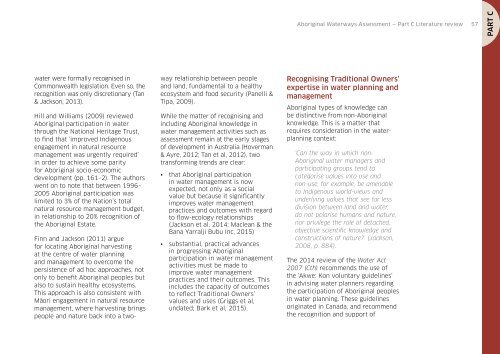Aboriginal Waterways Assessment program
dCckIF
dCckIF
Create successful ePaper yourself
Turn your PDF publications into a flip-book with our unique Google optimized e-Paper software.
<strong>Aboriginal</strong> <strong>Waterways</strong> <strong>Assessment</strong> — Part C Literature review 57<br />
PART C<br />
water were formally recognised in<br />
Commonwealth legislation. Even so, the<br />
recognition was only discretionary (Tan<br />
& Jackson, 2013).<br />
Hill and Williams (2009) reviewed<br />
<strong>Aboriginal</strong> participation in water<br />
through the National Heritage Trust,<br />
to find that ‘improved Indigenous<br />
engagement in natural resource<br />
management was urgently required’<br />
in order to achieve some parity<br />
for <strong>Aboriginal</strong> socio-economic<br />
development (pp. 161–2). The authors<br />
went on to note that between 1996–<br />
2005 <strong>Aboriginal</strong> participation was<br />
limited to 3% of the Nation’s total<br />
natural resource management budget,<br />
in relationship to 20% recognition of<br />
the <strong>Aboriginal</strong> Estate.<br />
Finn and Jackson (2011) argue<br />
for locating <strong>Aboriginal</strong> harvesting<br />
at the centre of water planning<br />
and management to overcome the<br />
persistence of ad hoc approaches, not<br />
only to benefit <strong>Aboriginal</strong> peoples but<br />
also to sustain healthy ecosystems.<br />
This approach is also consistent with<br />
Māori engagement in natural resource<br />
management, where harvesting brings<br />
people and nature back into a twoway<br />
relationship between people<br />
and land, fundamental to a healthy<br />
ecosystem and food security (Panelli &<br />
Tipa, 2009).<br />
While the matter of recognising and<br />
including <strong>Aboriginal</strong> knowledge in<br />
water management activities such as<br />
assessment remain at the early stages<br />
of development in Australia (Hoverman<br />
& Ayre, 2012; Tan et al, 2012), two<br />
transforming trends are clear:<br />
• that <strong>Aboriginal</strong> participation<br />
in water management is now<br />
expected, not only as a social<br />
value but because it significantly<br />
improves water management<br />
practices and outcomes with regard<br />
to flow-ecology relationships<br />
(Jackson et al, 2014; Maclean & the<br />
Bana Yarralji Bubu Inc, 2015)<br />
• substantial, practical advances<br />
in progressing <strong>Aboriginal</strong><br />
participation in water management<br />
activities must be made to<br />
improve water management<br />
practices and their outcomes. This<br />
includes the capacity of outcomes<br />
to reflect Traditional Owners’<br />
values and uses (Griggs et al,<br />
undated; Bark et al, 2015).<br />
Recognising Traditional Owners’<br />
expertise in water planning and<br />
management<br />
<strong>Aboriginal</strong> types of knowledge can<br />
be distinctive from non-<strong>Aboriginal</strong><br />
knowledge. This is a matter that<br />
requires consideration in the waterplanning<br />
context:<br />
‘Can the way in which non-<br />
<strong>Aboriginal</strong> water managers and<br />
participating groups tend to<br />
categorise values into use and<br />
non-use, for example, be amenable<br />
to Indigenous world-views and<br />
underlying values that see far less<br />
division between land and water,<br />
do not polarise humans and nature,<br />
nor privilege the role of detached,<br />
objective scientific knowledge and<br />
constructions of nature?’ (Jackson,<br />
2008, p. 884).<br />
The 2014 review of the Water Act<br />
2007 (Cth) recommends the use of<br />
the ‘Akwe: Kon voluntary guidelines’<br />
in advising water planners regarding<br />
the participation of <strong>Aboriginal</strong> peoples<br />
in water planning. These guidelines<br />
originated in Canada, and recommend<br />
the recognition and support of


